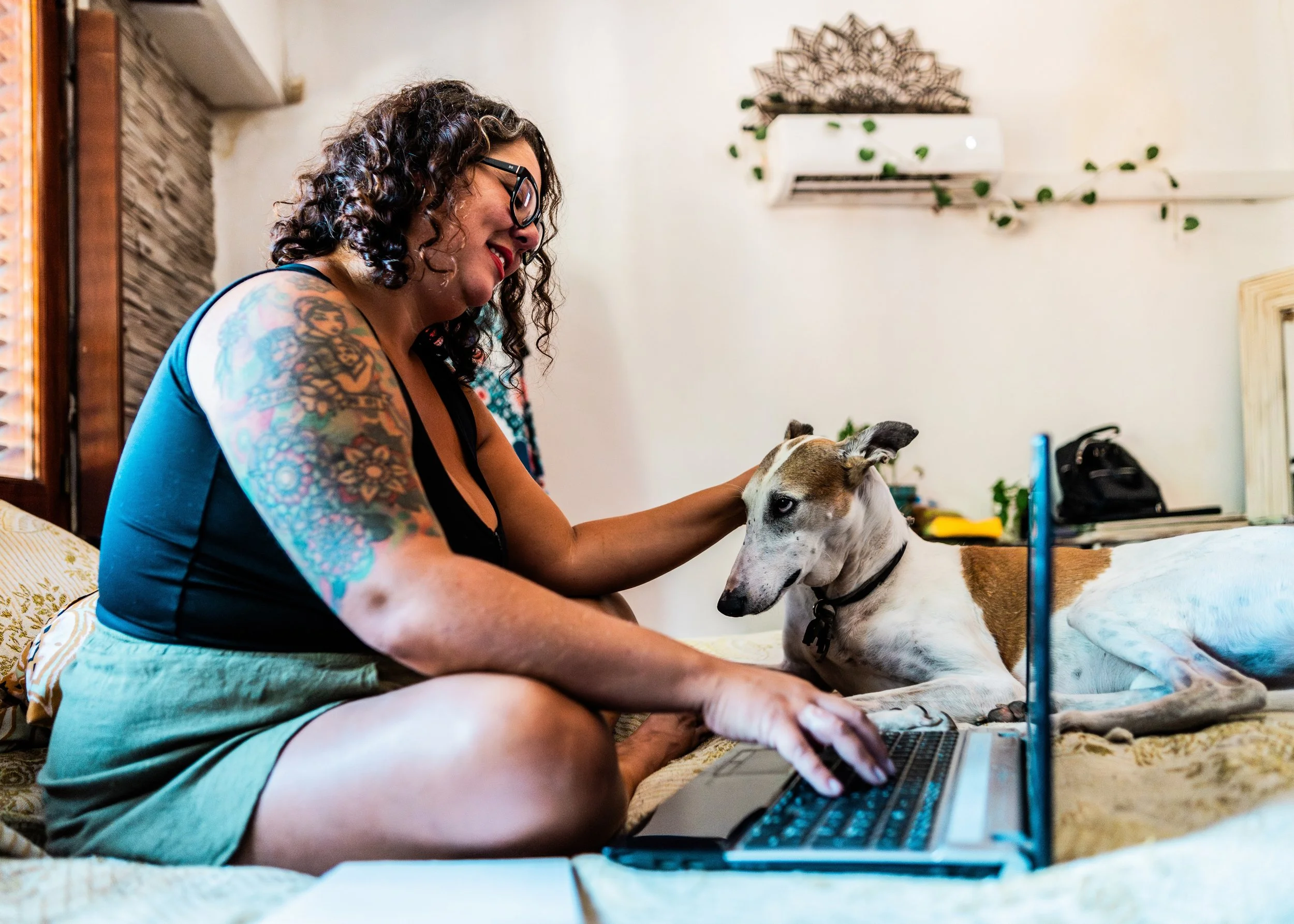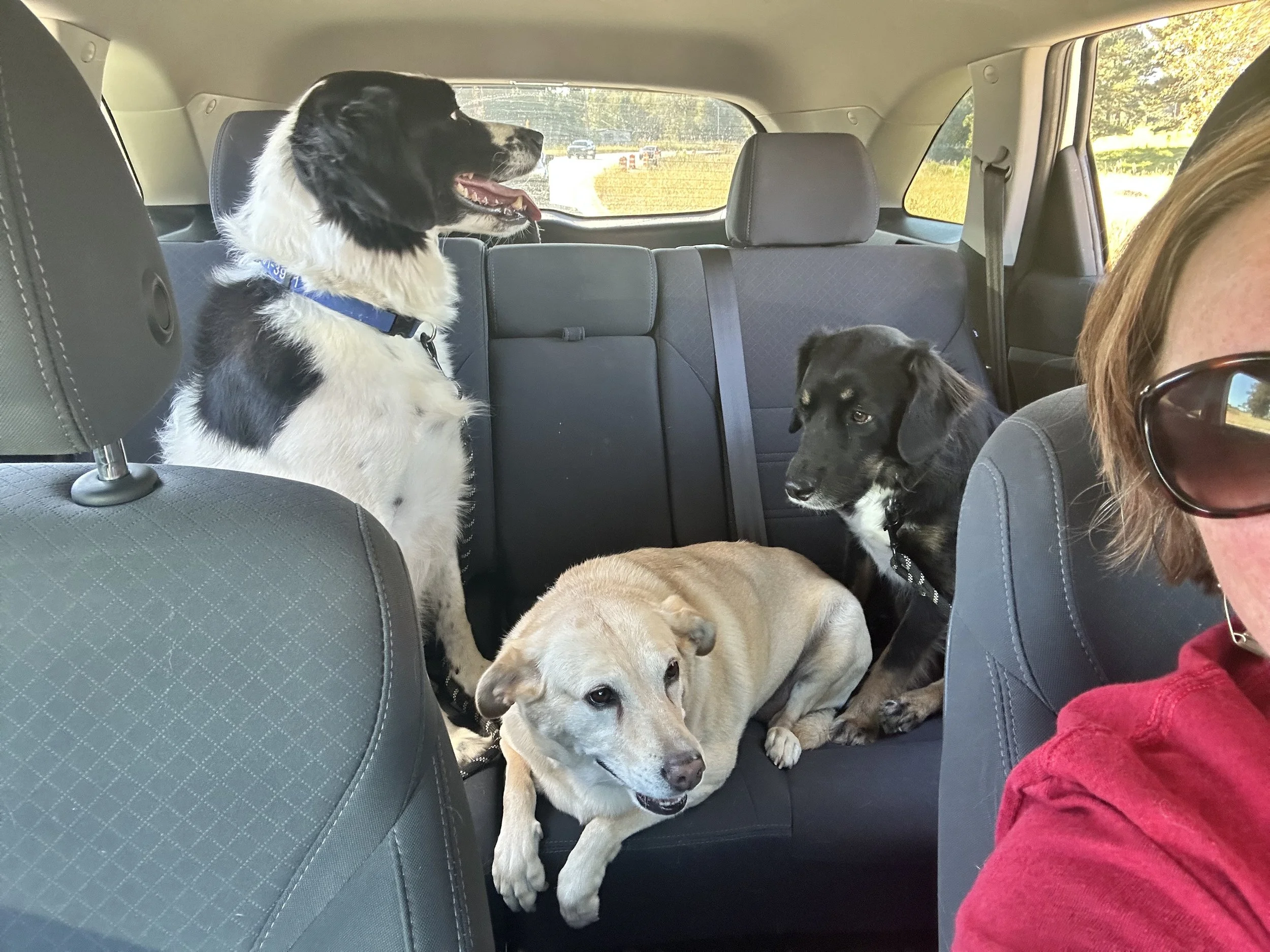A serene water fall in the woods, the water fall is surrounded by lush leaves. The water leads your eye to a calm, teal body of water.
Beth Reiter LPC, NCC
She/her/hers
Currently serving clients in Georgia & South Carolina remotely
I believe that therapy is a space where healing and self-discovery can unfold naturally, at your own pace. I love helping people find those aha! moments, where something clicks, and suddenly a new way of thinking or coping makes all the difference. Whether you’re navigating big emotions, adjusting to life transitions, or working through deep-seated patterns, I’m here to help you feel understood, supported, and empowered to create meaningful change. Above all, my goal is to meet you where you are, help you feel seen, and support you in creating a life that feels like your own, not one shaped solely by survival. Therapy should be a space where you can exist fully, without apology. I’m here to help you build that space.
-
I specialize in working with borderline personality disorder (BPD), emotional dysregulation, anxiety, depression, OCD, ADHD, late-diagnosed autism, grief, and adjustment challenges through a person-centered and affirming lens. My approach is practical, warm, and deeply collaborative. I meet you where you are and help you build the skills, awareness, and confidence to move forward in ways that feel right for you.
Book a consultation with me:
Living with borderline personality disorder (BPD) or bipolar disorder can feel like an emotional whirlwind, with intense highs, crushing lows, and relationships that sometimes feel unstable or overwhelming. If you’ve ever felt like your emotions take control before you even have a chance to process them, I want you to know that you can learn to work with your emotions instead of feeling consumed by them.
In therapy, we’ll use DBT, CBT, and mindfulness-based approaches to build emotional regulation, distress tolerance, and relationship stability. Together, we’ll explore what triggers emotional intensity, develop strategies to navigate overwhelming feelings, and help you create more stability in your life without losing the depth of who you are. Some of my favorite moments in therapy happen when a client recognizes they don’t have to be at war with their emotions, that they can exist in balance, without being completely controlled by the highs and lows. Growth happens in small steps, and over time, you’ll start to see those shifts in your own life.
Finding Balance Together
Change, whether expected or sudden, has a way of turning our world upside down. Losing a loved one, navigating a divorce, shifting careers, or adjusting to a major life transition can bring up feelings of grief, uncertainty, and self-doubt. When life shifts in ways we never planned for, it can feel like we’ve lost parts of ourselves along with it.
Therapy is where we make sense of what’s changed and start rebuilding at your own pace. We’ll use ACT, CBT, and narrative therapy to process grief, explore identity shifts, and create a path forward that honors both your loss and your future. I often remind clients that healing isn’t about rushing to “move on”, it’s about planting seeds for growth, even in the midst of grief. Over time, those seeds take root, and one day, you’ll find yourself standing on steadier ground, feeling just a little more like yourself again.
Healing Through Transitions: Guiding You After Major Loss
ADHD & OCD Person-Centered Care
When I work with clients who have ADHD, I approach our time together with deep empathy, curiosity, and zero shame. I know firsthand how often people with ADHD are told they’re “too much,” “not enough,” or “just need to try harder,” and I’m here to help you detach from those narratives. ADHD isn’t a motivation issue or a lack of willpower; it’s a brain that processes, organizes, and responds to the world differently. I want my clients to feel understood and supported as their full selves, not as a “fix-it project.” Together, we explore how your brain works, what systems or environments help you thrive, and what narratives may need rewriting.
In our work, I focus on building practical tools that feel usable, not just more “shoulds” on your plate. That might look like experimenting with body doubling, visual timers, values-based planning, or somatic strategies for overwhelm. We also talk about the emotional side of ADHD: the rejection sensitivity, the executive function fatigue, and the grief around time and energy. I believe in celebrating creativity, nonlinear thinking, and all the ways ADHD brains bring brilliance into the world. My job isn’t to make you more “neurotypical”; it’s to help you work with your brain instead of against it, with compassion and care at the center of it all.
When I work with folks navigating OCD, I start by creating a space that feels safe, grounded, and nonjudgmental. I know how exhausting and shame-inducing intrusive thoughts and compulsions can be, and I want my clients to know right away that there is nothing “wrong” with them. OCD isn’t a character flaw; it’s a brain-based condition often fueled by fear, responsibility, and a desire to protect. So rather than rushing into exposures, I begin by building trust, helping clients feel seen and understood, especially if they’ve had past experiences where they felt dismissed or pathologized.
Once we have a strong foundation, I gently introduce Exposure and Response Prevention (ERP) in a way that’s collaborative and centered on the client’s pace and values. We talk about the function of compulsions, the role of avoidance, and how OCD can entangle itself with identity and trauma. I often weave in mindfulness, somatic awareness, and self-compassion practices to help clients tolerate uncertainty and reconnect with the life they want to lead, not just one where symptoms are managed, but one that feels meaningful, empowered, and authentically theirs.
Struggling with substance use doesn’t mean you’re failing. It doesn’t mean you’re broken. It means you’re coping in the best way you know how right now. And if you’re looking for support—whether that means reducing use, exploring alternatives, or working toward sobriety—I’m here to help, without judgment or shame.
My approach is harm reduction-focused, secular, and built around what works for you. Whether you’re interested in Smart Recovery, moderation strategies, or exploring the role substances play in your life, therapy is a space to understand your relationship with substances, build emotional regulation skills, and create a plan that fits your needs. One of the most powerful moments in this work is when a client realizes they have options—that recovery isn’t one-size-fits-all, and that healing is possible in ways they never imagined. We’ll go at your pace, focusing on progress, not perfection. No matter where you are in your journey, you don’t have to figure it out alone.
Substance MisUse & Recovery: A Harm Reduction Approach to Healing
My Specialties
-
Living with borderline personality disorder (BPD) can feel like an emotional storm—intense highs and lows, overwhelming feelings, deep fears of abandonment, and relationships that sometimes feel like they’re constantly shifting. If this sounds familiar, I want you to know that you aren’t broken, and you don’t have to stay stuck in the same painful cycles forever. Therapy is a place where we can slow things down, make sense of what’s happening, and work together to help you build the stability, emotional regulation, and self-trust you deserve.
In our work together, I use Dialectical Behavior Therapy (DBT) and Cognitive Behavioral Therapy (CBT) to help you understand your emotions, manage distress, and create healthier relationship patterns. We’ll focus on skills like distress tolerance (so emotions don’t feel like they control you), interpersonal effectiveness (so you can communicate in a way that gets your needs met), and mindfulness (so you can stay grounded instead of getting swept up in the moment). I also integrate narrative therapy and strengths-based approaches, helping you explore the stories you’ve been told about yourself—and rewrite them in a way that reflects your resilience, not just your struggles.
One of my favorite moments in therapy is when a client realizes that they are not their diagnosis—that they are capable of having strong emotions without being controlled by them, that their relationships can feel stable, and that they deserve love and connection that feels safe and reciprocal. Change doesn’t happen overnight, but through small, intentional steps, we plant the seeds for a future where you feel more in control, more secure, and more confident in who you are. Therapy is about learning to work with your emotions rather than feeling like they’re working against you. And I’m here to help you through that journey, every step of the way.
-
Living with bipolar disorder can feel like being caught between extremes—some days, you’re filled with energy, ideas, and motivation, while other days, it’s hard to get out of bed or find a sense of purpose. The unpredictability can be exhausting, making it hard to trust yourself, your emotions, or your ability to plan for the future. But here’s the truth: bipolar disorder doesn’t have to define you, and you don’t have to ride this rollercoaster alone.In therapy, I help clients with bipolar I, bipolar II, and cyclothymia learn how to recognize mood patterns, develop emotional regulation strategies, and build stability in a way that fits their life. We use Cognitive Behavioral Therapy (CBT) and Dialectical Behavior Therapy (DBT) to work on managing both the highs and the lows—so that when hypomania or depression start creeping in, you have tools to catch it early and respond rather than react. Together, we’ll explore triggers, create personalized routines that promote balance, and work through any self-doubt, shame, or identity struggles that often come with a bipolar diagnosis.
One of my favorite moments in therapy is when a client realizes that they can create a sense of stability, even when their brain wants to pull them in different directions. That they do have the power to notice the early signs of a mood shift and make choices that help them feel more in control. Therapy is about planting those seeds of self-awareness, resilience, and self-trust—so that, over time, you feel less at the mercy of your mood and more in charge of your own life. You are not just your diagnosis, and together, we’ll work toward a future where you feel grounded, capable, and in control of your path forward.
-
When I work with folks navigating OCD, I start by creating a space that feels safe, grounded, and nonjudgmental. I know how exhausting and shame-inducing intrusive thoughts and compulsions can be, and I want my clients to know right away that there is nothing “wrong” with them. OCD isn’t a character flaw; it’s a brain-based condition often fueled by fear, responsibility, and a desire to protect. So rather than rushing into exposures, I begin by building trust, helping clients feel seen and understood, especially if they’ve had past experiences where they felt dismissed or pathologized.
Once we have a strong foundation, I gently introduce Exposure and Response Prevention (ERP) in a way that’s collaborative and centered on the client’s pace and values. We talk about the function of compulsions, the role of avoidance, and how OCD can entangle itself with identity and trauma. I often weave in mindfulness, somatic awareness, and self-compassion practices to help clients tolerate uncertainty and reconnect with the life they want to lead, not just one where symptoms are managed, but one that feels meaningful, empowered, and authentically theirs. -
When I work with clients who have ADHD, I approach our time together with deep empathy, curiosity, and zero shame. I know firsthand how often people with ADHD are told they’re “too much,” “not enough,” or “just need to try harder,” and I’m here to help you detach from those narratives. ADHD isn’t a motivation issue or a lack of willpower; it’s a brain that processes, organizes, and responds to the world differently. I want my clients to feel understood and supported as their full selves, not as a “fix-it project.” Together, we explore how your brain works, what systems or environments help you thrive, and what narratives may need rewriting.
In our work, I focus on building practical tools that feel usable, not just more “shoulds” on your plate. That might look like experimenting with body doubling, visual timers, values-based planning, or somatic strategies for overwhelm. We also talk about the emotional side of ADHD: the rejection sensitivity, the executive function fatigue, and the grief around time and energy. I believe in celebrating creativity, nonlinear thinking, and all the ways ADHD brains bring brilliance into the world. My job isn’t to make you more “neurotypical”; it’s to help you work with your brain instead of against it, with compassion and care at the center of it all. -
With a special focus on late-diagnosed folks and folks who self-identify:
I know how often late-diagnosed folks have felt misunderstood, dismissed, or told to “mask” just to get by. I want you to know this is a space where you don’t have to hide parts of yourself. Together, we’ll work on unlearning shame, honoring your needs, and finding practical ways to move through the world that feel authentic and sustainable. My goal is to support you in embracing your whole self, not as “too much” or “not enough,” but as worthy, valid, and celebrated exactly as you are. -
Trauma isn’t just something that happened—it stays with you, shaping how you see yourself, your relationships, and the world around you. Maybe you find yourself stuck in cycles of anxiety, emotional numbness, self-doubt, or hypervigilance, feeling like you can’t fully relax or trust others. Or maybe you’re carrying guilt, shame, or memories that feel too painful to confront. No matter what your trauma looks like, I want you to know this: your reactions make sense, your experiences are valid, and healing is possible.
I approach trauma therapy with compassion, patience, and deep respect for your individual process. I never push clients to relive painful experiences before they’re ready—instead, we focus on building emotional safety, self-regulation skills, and a sense of control over your own healing journey. Using Cognitive Behavioral Therapy (CBT), Dialectical Behavior Therapy (DBT), and mindfulness-based techniques, we’ll work on recognizing triggers, understanding emotional responses, and gently untangling the ways trauma has shaped your thoughts and behaviors.
One of the most powerful moments in therapy is when a client realizes that they are not broken—that their reactions are a survival response, not a personal failure. That they can begin to trust themselves again, feel safe in their own body, and move through life without carrying the weight of the past alone. Healing from trauma doesn’t happen overnight, but together, we’ll plant the seeds for growth, resilience, and a future where you feel more like yourself again.
-
Therapy should be a place where you feel safe, heard, and supported—without pressure to conform to any particular belief system. If you’ve ever felt disconnected from traditional faith-based approaches to mental health, struggled with religious trauma, or simply want therapy that focuses on science-backed, evidence-based practices, I provide a fully secular, non-religious approach to healing and personal growth.
In my work, I use Cognitive Behavioral Therapy (CBT), Dialectical Behavior Therapy (DBT), Acceptance and Commitment Therapy (ACT), and Smart Recovery to help clients manage anxiety, depression, emotional regulation, substance use, and life transitions—all through a rational, science-based lens. Whether you’ve stepped away from religious beliefs, never had them to begin with, or are still figuring out your personal values, you deserve therapy that meets you where you are without judgment.
One of my favorite moments in therapy is when a client realizes they have the power to define their own sense of purpose, morality, and fulfillment—free from external pressures or expectations. Therapy is about planting the seeds for self-trust, helping you feel grounded in your own values, decisions, and beliefs—whatever those may be. In this space, you are welcome exactly as you are, and we’ll work together to create a path forward that aligns with your truth, not anyone else’s.
-
Anxiety has a way of making everything feel overwhelming—your mind races with “what-ifs,” your body feels tense, and no matter how hard you try, it seems impossible to shut it off. If you find yourself stuck in patterns of overthinking, perfectionism, or constant worry, I want you to know that you don’t have to live this way forever. Anxiety doesn’t have to control your life, and therapy can help you create space between you and the anxious thoughts that try to run the show.
In our work together, I use Cognitive Behavioral Therapy (CBT), mindfulness, and acceptance-based approaches to help you identify anxious thought patterns, challenge cognitive distortions, and develop tools to stay present rather than getting lost in worst-case scenarios. Anxiety often tells us stories that feel true—but that doesn’t mean they are true. Therapy is about learning to recognize those stories, reframe them, and develop practical coping skills so you feel more in control of your thoughts, emotions, and reactions.
One of my favorite moments in therapy is when a client realizes that they can challenge their anxious thoughts instead of automatically believing them. That they don’t have to live in a constant state of fear or over-preparedness. That their mind can be a quieter, more peaceful place. These are the seeds we plant—small shifts in awareness that, over time, grow into a sense of calm, confidence, and trust in yourself.
-
I offer 2SLGBTQIA+ affirming therapy, creating a safe and supportive space where you can show up fully as yourself. My approach is inclusive, compassionate, and focused on honoring your identity while supporting your growth and wellbeing.
-
Grief isn’t just something you “get over.” It’s something you carry, something that reshapes your world. But when grief lingers in a way that feels unbearable—when the pain doesn’t seem to lessen, when it keeps you stuck in cycles of guilt, anger, or isolation—you might wonder if you’ll ever feel like yourself again. Complicated grief can make moving forward feel impossible, leaving you caught between holding on to the past and struggling to exist in the present.
I want you to know that your grief is valid, and there is no “right” way to heal. In therapy, we’ll create a space where you can process loss, regret, and the emotions that feel too big to carry alone. Using Cognitive Behavioral Therapy (CBT), narrative therapy, and mindfulness-based approaches, we’ll explore what grief means for you, how to honor what (or who) you’ve lost, and how to reconnect with life in a way that doesn’t erase your love or memories. We won’t rush or force anything—this is about planting the smallest seeds of healing, finding those tiny moments of relief, and eventually seeing glimpses of light through the fog.
One of the most profound moments in therapy is when a client realizes that healing doesn’t mean forgetting—that they can hold onto love while still allowing themselves to live. That they can experience joy again without guilt. That their grief is not a roadblock but a reflection of deep love and connection. If you feel like your world has changed in a way you don’t recognize, I’m here to walk beside you—at your pace—until you find solid ground again.
-
Change has a way of throwing everything off balance—even when it’s something we chose or thought we were ready for. Whether you’re navigating a career shift, a major move, a breakup, parenthood, retirement, or stepping into a new version of yourself, these transitions can leave you feeling disoriented, anxious, or even grieving what used to be. Adjusting to something new—especially when it disrupts your sense of identity or routine—can feel overwhelming.
If you’re struggling to find your footing, you’re not alone. In therapy, we’ll slow things down, make sense of the emotions that come with change, and figure out what stability looks like for you. I use Cognitive Behavioral Therapy (CBT), Acceptance and Commitment Therapy (ACT), and mindfulness-based strategies to help you recognize unhelpful thought patterns, ease self-doubt, and build resilience in the face of uncertainty.
One of my favorite moments in therapy is when a client realizes that they don’t have to have all the answers right now. That they can take small steps forward even when the future feels unclear. That they can rebuild a sense of self, confidence, and purpose—even in the middle of change. Adjustment takes time, and we’ll plant those seeds of self-trust together—so that, over time, you can step into this new chapter feeling grounded, capable, and in control of your path forward.
-
Anger isn’t a problem—it’s an emotion, just like any other. It’s a signal that something feels unfair, out of control, or deeply painful. But when anger becomes overwhelming—leading to outbursts, strained relationships, or internalized frustration—it can feel like it’s controlling you instead of the other way around. If you’ve ever been told you’re “too angry” or felt ashamed of your reactions, I want you to know: your anger is valid. The goal isn’t to suppress it—it’s to understand it, express it in a healthy way, and channel it into something productive.
In therapy, I help clients develop a healthier relationship with anger by using Cognitive Behavioral Therapy (CBT), Dialectical Behavior Therapy (DBT), and mindfulness-based techniques to:
Identify the underlying thoughts and emotions that fuel anger (often fear, hurt, or unmet needs).
Recognize early warning signs before anger escalates.
Develop distress tolerance skills to pause, reflect, and respond instead of reacting impulsively.
Reframe unhelpful thought patterns that keep you stuck in cycles of frustration and resentment.
Explore new ways to communicate anger without damaging relationships or self-worth.
Some of my favorite moments in therapy happen when a client realizes that anger isn’t something to be feared or avoided—it’s a tool for self-awareness, boundary-setting, and self-advocacy. Therapy is where we plant the seeds of emotional regulation and self-control so that, over time, anger becomes something you can work with, rather than something that works against you. You deserve to feel heard, understood, and in control of your emotions, and I’m here to help you find that balance.
-
Emotions can feel overwhelming—like they hit you out of nowhere and take over before you even have time to process them. If you’ve ever felt like you’re stuck in a cycle of emotional highs and lows, struggling to manage distress, or feeling like your relationships are constantly on edge, Dialectical Behavior Therapy (DBT) can help.
In therapy, I use DBT skills to help clients develop emotional regulation, distress tolerance, mindfulness, and interpersonal effectiveness. This means learning how to navigate intense emotions without feeling consumed by them, how to handle distress without turning to harmful coping mechanisms, and how to communicate and set boundaries in a way that supports healthy relationships. One of my favorite parts of DBT is helping clients see that they can have big emotions and make choices that align with their values—emotions don’t have to control everything.
I love those moments when a client realizes they handled a tough situation differently than they would have in the past. Maybe they paused before reacting, used a distress tolerance skill, or communicated their needs in a way that actually felt good. These are the seeds we plant in therapy—small changes that grow into real emotional stability and self-trust. DBT isn’t about suppressing emotions; it’s about learning how to live with them, work with them, and move through life in a way that feels more balanced, more intentional, and more in control.
-
Thoughts are powerful. They shape how we see ourselves, how we respond to the world, and how we navigate challenges. But sometimes, our thoughts work against us—keeping us stuck in self-doubt, reinforcing patterns of anxiety, or making it harder to break free from cycles of emotional distress. That’s where Cognitive Behavioral Therapy (CBT) comes in.
In therapy, I help clients identify unhelpful thought patterns—the automatic beliefs that fuel anxiety, depression, or emotional reactivity. Using CBT techniques, we’ll work together to reframe those thoughts, challenge cognitive distortions, and develop more balanced ways of thinking. For example, if you struggle with self-criticism, we might explore where those thoughts come from and practice shifting toward more self-compassionate perspectives. If you experience intense emotions that feel impossible to control, we’ll use CBT strategies to recognize the triggers behind those emotions and develop coping tools that actually work.
One of my favorite moments in therapy is when a client has an aha! moment—when they realize they don’t have to believe every thought that pops into their head. That they have the power to change the narrative they’ve been living by. That they can respond to challenges in a way that aligns with who they want to be, not just who they’ve been told they are. These small shifts in thinking create real, lasting changes over time—helping you feel more in control, more grounded, and more capable of facing whatever life throws your way.
-
If you’re looking for an alternative to traditional 12-step programs, SMART Recovery offers a secular, evidence-based approach to substance use and addictive behaviors. I integrate SMART Recovery principles into therapy to help clients build self-empowerment, coping skills, and relapse prevention strategies that align with their personal values and goals—whether that means moderation, harm reduction, or long-term sobriety.
Rather than viewing addiction as a disease requiring lifelong surrender, SMART Recovery focuses on the power of choice, self-awareness, and behavioral change. In our work together, we’ll explore the four key areas of SMART Recovery:
Building Motivation – Identifying your personal reasons for change and strengthening your commitment to growth.
Coping with Urges – Learning practical techniques to manage cravings, triggers, and emotional distress.
Managing Thoughts, Feelings, and Behaviors – Using Cognitive Behavioral Therapy (CBT) and Rational Emotive Behavior Therapy (REBT) to shift unhelpful thought patterns and develop healthier coping strategies.
Living a Balanced Life – Creating sustainable routines, reconnecting with what brings you joy, and building a future that supports your long-term well-being.
One of the most powerful moments in therapy is when a client realizes they have control over their recovery—that they aren’t powerless, that they can develop the tools to manage cravings, and that change is possible without shame or rigid one-size-fits-all rules. Whether you’re working toward sobriety, exploring harm reduction, or navigating the complexities of relapse prevention, I provide a supportive, nonjudgmental space where you can define recovery on your own terms.
My approach and what a session with me looks like:
Therapy with me is collaborative, validating, and built around what works for you. I don’t believe in a one-size-fits-all approach; every client is different, and our work together will be tailored to your unique experiences, needs, and goals. My role isn’t to “fix” you or tell you what to do; it’s to help you understand yourself more deeply, challenge unhelpful patterns, and build the tools you need to navigate life with more confidence and stability. I take a warm, down-to-earth, and practical approach, blending CBT, DBT, mindfulness, and strengths-based therapy to help you create meaningful, sustainable change.
Sometimes that means structured skill-building; other times, it’s about processing emotions and exploring deeper patterns. Regardless of where you are, you can expect an affirming, judgment-free space that is tailored to your pace. I love seeing those moments when things start to click for my clients, when a new perspective opens up, when a skill they’ve practiced suddenly works, or when they start to trust themselves in ways they didn’t before. Therapy isn’t about changing who you are; it’s about helping you step into your own strength, resilience, and self-understanding.
Badges, Certifications, & Directories
Openings available
I accept:
Self-pay
Sliding scale
Open Path
Out-of-network benefits
FSA/HSA
In network with:
Aetna
Credentialing in progress for:
Ambetter
BCBS
For clients wishing to use out-of-network benefits:
We've partnered with Mentaya, a service that streamlines getting reimbursed for your therapy sessions through out-of-network benefits.
See if you qualify: https://mentaya.co/checkbenefits/counselingzebra
Mentaya is perfect if you:
• Have out-of-network benefits
• Feel overwhelmed by superbills and insurance
• Have submitted superbills but failed to get any reimbursement
• Simply want to skip the hassle of paperwork!
You can also use the tool below to check your out-of-network benefits:
Working with me
Use the calendar below to schedule a free 15-minute consultation phone call with the therapist you would like to work with, or you can contact us through the contact form for help scheduling a free 15-minute video chat consultation!
Schedule a consult call
Fill out some info, and we will be in touch shortly! We can't wait to hear from you!
My furry office assistants
Sammy (red dachshund)
JoJo (black dachshund)
Both 17 years old
Sammy and JoJo were my first set of twins before I had twins














